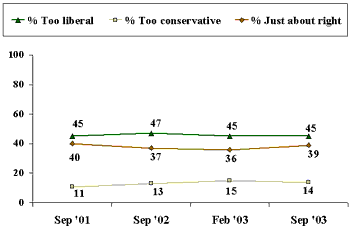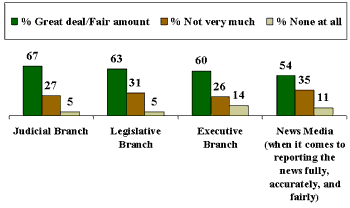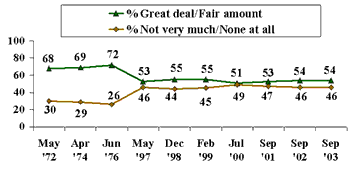GALLUP NEWS SERVICE
PRINCETON, NJ -- Forty-five percent of Americans believe the news media in this country are too liberal, while only 14% say the news media are too conservative. These perceptions of liberal inclination have not changed over the last three years. A majority of Americans who describe their political views as conservative perceive liberal leanings in the media, while only about a third of self-described liberals perceive conservative leanings.
More generally, the Sept. 8-10 Gallup Poll finds that a little more than half of Americans have a great deal or fair amount of trust in the news media when it comes to reporting the news fully, accurately, and fairly. Trust in the news media has not changed significantly over the last six years. Conservatives have a slightly lower level of trust in the media than either moderates or liberals do.
News Media Too Liberal?
Gallup has asked Americans four times in recent years if they perceive the news media as too liberal, too conservative, or about right, with the following results:
| In general, do you think the news media is -- too liberal, just about right, or too conservative? |
 |
Americans have been considerably more likely to perceive the news media as too liberal than as too conservative the last four times this question has been posed. One's interpretation of these findings is, to a degree, dependent on one's perspective. It's true that substantially more Americans say that the news media are too liberal than say they are too conservative. At the same time, a majority says that the news media are either too conservative, or just about right.
It's perhaps surprising that there has been such little variation in this sentiment over the last three years -- given the continuing focus on alleged media bias over this time period, including best-selling books such as Bias by Bernard Goldberg and Slander by Ann Coulter, which have alleged systematic liberal bias in the news media. The ratings success of the Fox News channel has been based in part on its attempt to appeal to conservative viewers who feel that the more traditional news media are liberal and biased.
It is clear that the underlying dynamic behind the finding that the news media are too liberal is the widespread belief among conservatives that the news media are too liberal, contrasted with the far less prevalent view among liberals that the news media are too conservative. Additionally, liberals are twice as likely to say that the media are too liberal (18%) as conservatives are to say they are too conservative (9%). Moderates are more "moderate" in their views, but still roughly as many say the news media are too liberal as say they are about right, and relatively few moderates say the news media are too conservative.
Plus, about 4 in 10 Americans today identify themselves as conservatives and about the same number identify as moderates, while less than 20% identify as liberals. Given all of this, the overall conclusion is that Americans, on average, are more likely to see the news media as too liberal than too conservative:
|
Ideology and the News Media |
|||
|
Too |
About |
Too |
|
|
% |
% |
% |
|
|
Conservatives |
|||
|
2003 Sep 8-10 |
60 |
29 |
9 |
|
2002 Sep 5-8 |
63 |
27 |
9 |
|
2001 Sep 7-10 |
62 |
29 |
7 |
|
Moderates |
|||
|
2003 Sep 8-10 |
40 |
44 |
15 |
|
2002 Sep 5-8 |
45 |
40 |
13 |
|
2001 Sep 7-10 |
44 |
46 |
8 |
|
Liberals |
|||
|
2003 Sep 8-10 |
18 |
50 |
30 |
|
2002 Sep 5-8 |
21 |
52 |
22 |
|
2001 Sep 7-10 |
19 |
49 |
25 |
Trust in the Media
More generally, a majority of Americans have a great deal or fair amount of trust in the news media when it comes to reporting the news fully, accurately, and fairly. By way of comparison, that's a considerably lower level of trust than is placed in the each of the three main branches of the U.S. government.
| Public Confidence in Branches of
Government And in News Media |
 |
| September 8-10, 2003 |
One interesting finding from the poll is the general lack of change in this trust measure over the last six years. Gallup first asked Americans about their trust and confidence in the media back in the 1970s, but stopped at that point and didn't begin to use the question again until 1997.
There was a clear change in views of the media between these two periods of time. About 7 in 10 Americans said they had a great deal or fair amount of trust and confidence in the media in 1972, 1974, and 1976, perhaps reflecting public approval of the news media's role in uncovering the Watergate abuses of power. When Gallup picked up the question series again six years ago, however, the trust levels had fallen to the mid-50% range.
| In general, how much trust and confidence do you have in the mass media -- such as newspapers, T.V. and radio -- when it comes to reporting the news fully, accurately, and fairly -- a great deal, a fair amount, not very much, or none at all? |
 |
The constancy in ratings of trust and confidence in the news media has occurred in an environment that has included not only ideological criticism of the media's news coverage, but also high visibility media missteps, including in particular the allegations of journalistic malfeasance against former New York Times reporter Jayson Blair (which ended in a major investigation by that paper and his ultimate resignation).
Perhaps not surprisingly, given the findings above highlighting conservatives' perception that the media is too liberal, there is a tendency for those Americans who identify themselves as conservatives to have a lower level of trust and confidence in the media than those who identify themselves as moderates or liberals do. But the differences among these three groups in that regard are not highly significant. In the most recent Sept. 8-10 survey, 50% of conservatives say they have a great deal or fair amount of trust in the news media, compared to 56% of liberals and 58% of moderates.
|
Trust in the Mass Media by Ideology |
||||
|
National |
Conservatives |
Moderates |
Liberals |
|
|
% |
% |
% |
% |
|
|
2003 Sep 8-10 |
54 |
50 |
58 |
56 |
|
2002 Sep 5-8 |
54 |
49 |
54 |
62 |
|
2001 Sep 7-10 |
53 |
47 |
54 |
61 |
|
2000 Jul 6-9 |
51 |
49 |
50 |
55 |
|
1999 Feb 4-8 |
55 |
50 |
58 |
60 |
|
1998 Dec 28-29 |
55 |
50 |
59 |
55 |
|
1997 May 30-Jun 1 |
53 |
51 |
53 |
60 |
Survey Methods
These results are based on telephone interviews with a randomly selected national sample of 1,025 adults, aged 18 and older, conducted Sept. 8-10, 2003. For results based on this sample, one can say with 95% confidence that the maximum error attributable to sampling and other random effects is ±3 percentage points. In addition to sampling error, question wording and practical difficulties in conducting surveys can introduce error or bias into the findings of public opinion polls.
